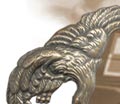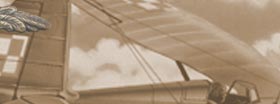

























|
Stanley Jeziorski
The following story has been kindly donated by Jim Jeziorski. All copyright belongs to the
Jeziorski family and permission is required for any part to be copied. The Jeziorski family
reserve all rights to these materials for any publication including electronic media.
In September 1937, I began a new chapter of my life. I had always been fascinated by the way military uniforms seemed to attract young girls. Also, two of my cousins wore Polish uniforms, one in the Air Force and the other in the Armored Forces and I personally admired their military bearing. So I applied to enter the School for Minors in SREM, a training academy for non-commissioned officers for the Polish Army.
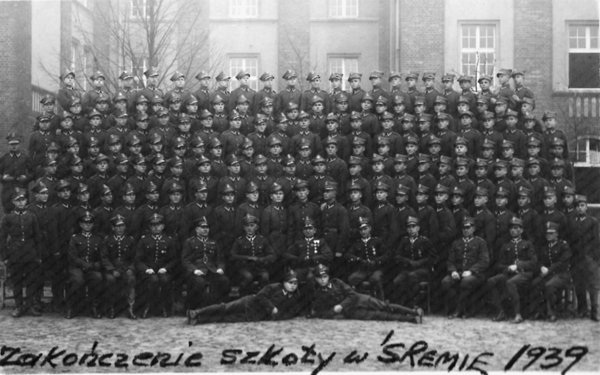
My dream was fulfilled! I was accepted! The military discipline was very exacting for me and my colleagues, all of us only seventeen years old; many of those who began the training did not finish. Our first summer camp in Southern Poland and the parachute course in POZNAN were very rigorous and further hardened us to the military life.
Early in 1939, I was assigned to the Eighteenth Infantry Regiment in SKIERNIEWICE, near WARSAW, for additional experience. In August, I returned to the School for graduation and immediately was posted to the Third Infantry Regiment in JAROSLAW (South Poland) where the Regiment was already in a defensive position against the invading German army. I was given the task of patrolling the city of JAROSLAW. Very intense bombardment of the railyards and the railway network caused many casualties among the civilian population. A child, who was being held in his mother's arms, was hit by a bomb's shrapnel. To this day I remember the horrified look on her face.
Within a very short time, we were ordered to abandon the garrison in JAROSLAW. During the retreat toward LWOW, I was in charge of the machine gun. One of our duties was to try to hold back the Germans with sporadic gunfire. A single machine gun against a tank battalion just didn't make much sense to me or my group, so we retreated, hoping to fight another day. At about the time we left JAROSLAW we heard that the Russian Army was coming to our rescue.
Unfortunately, that was not the case - the Soviet Army entered Poland as an enemy and began to disarm us. Luckily they released us and allowed us to return to our homes.
After being disarmed by the Russians in MONASTERZYSKACH I managed to get to LWOW, where by accident I ran into an uncle who helped me financially. A few days later I was on my way home to my native ZYWIEC. It was not an easy trip, but I soon found myself among my family, which had heard rumors that I had been killed. It was a very happy reunion, but lasted only a very short time-a matter of a few months, at the most.
By April, 1940, the Germans were severely persecuting our people; raiding towns and villages and making arrests with or without provocation. The situation became so bad that I felt that I had to leave my country. I contacted the resistance forces and was given instructions on how to cross into Czechoslovakia and then into Hungary. With four other men and a hand-held compass, I set out on what would be a long and hazardous journey. We travelled at night resting and searching for food and drink during the day. There was almost no problem crossing into Czechoslovakia or in reaching and crossing the Hungarian border and we found ourselves in the right place according to the instructions we had received before leaving Poland. We were so happy to have made it this far and decided to rest and enjoy the freedom. But our freedom lasted only a single day. Early the next morning we were arrested by the Hungarian Police who placed us in detention for two days until a trial could be held. Because the trail was in Hungarian, we didn't understand any of it, but the police took us back to the Czechoslovakian border where we were forced to cross back over. Luckily there was a terrible rain storm, a heavy downpour, and the Hungarian police left us to find shelter. We used the opportunity to run quickly back across the Hungarian Border.
Having already had some experience, we again travelled by night and rested during the day. After the second night of walking, we came to a small village, tired and hungry and knocked at the door of a house. Even though we did not know any Hungarian language somehow we were able to communicate with them. They even showed us to a cloister in which some other Polish refugees were staying. After our identities were checked all the military personnel were sent to Budapest and later on to the Yugoslavian border. My military status was very helpful and was the cause of my further journeys.
We crossed the Yugoslavian border at night in small groups. Most of the other Polish refugees were older, many of them women with large, heavy suitcases. After crossing the border, we went by train to ZAGREB where we were issued new passports by the Polish Consulate. I have no idea why we were to choose new names, but when asked what new name I wanted on my new passport (looking out the window I saw a horse and buggy passing by) I chose the Polish equivalent of “Teamster”.
I want to point out that we were furnished currency by the Polish Consul Agency for each of the countries through which we travelled.
We travelled by rail across Yugoslavia to Salonica, Greece, and then to Constantinople, Turkey. Here we had an opportunity to do some sightseeing particularly enjoying the beautiful mosques. Leaving Constantinople, the group crossed Turkey and entered Syria, a French Protectorate, where at HOMS, the Carpathian Brigade was formed. Immediately as a young military school graduate, I was recruited.
When France fell to the Germans, the Carpathian Brigade had to leave Syria. We moved, with all our equipment to Palestine, which was under British control. One highlight of the time in Palestine was bathing in the Dead Sea-so salty that you couldn't possibly drown. We went through Jerusalem to Latrun, where we underwent some very intensive retraining in a center for new military personnel. As a graduate of the Military School in SREM, I lectured on firearms to our Company. I was also an instructor in the newly-organized School for Non-Commissioned Officers.
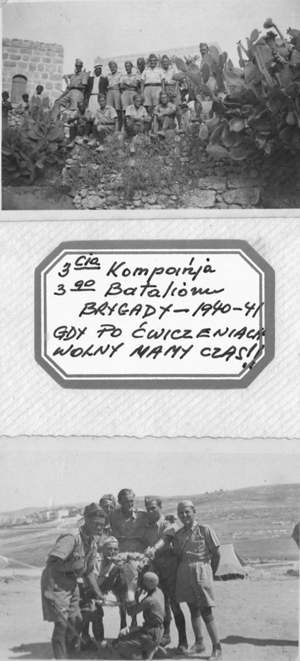
Carpathian Brigade
While in Latrun, a training center, I took advantage to visit the highlights of Palestine which included Jerusalem's ancient wall, Christ's Tomb, Jericho, The Mount of Temptation, the Grotto of St Helen, Jericho's Good Samaritan Inn, Bethlehem and many other interesting places. Tel Aviv, a modern city, with the Yarkon River flowing through it, was very impressive.
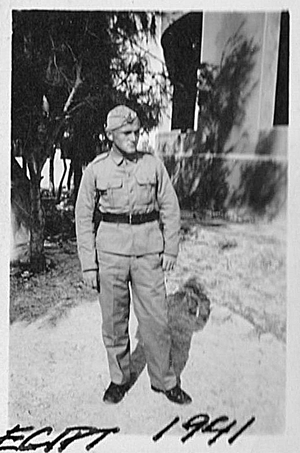
Egypt 1941
|
|
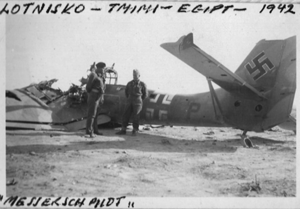
Egypt 1942
|
The Independent Carpathian Brigade, under the command of Colonel Kopanski, who was later a general, was very quickly combat-ready and in October, 1940, was transferred to Egypt. During our short stay near Alexandria, my Company's primary duty was to stand guard at the airfield of the British Royal Navy. In August of 1941, we were placed on a sudden night-time alert and were embarked, in full combat gear, on a British military ship sailing for an unknown destination. We reached shore at night. After landing and a short march, we were told to rest and were served tea and crackers. Even though I was thirsty, I could not drink the tea as it was made with partially - distilled seawater from the Mediterranean; however, I soon became used to the salty flavor. We were finally told that we had landed at Tobruk, a Libyan port on the Mediterranean. The British had been able to hold the port and its defense lines in spite of several attempts to overtake Tobruk.
Our Company's first assignment in Tobruk was a hill named Fort Pilastrino. A short briefing about field mines by our Company Commander ended in tragedy as he was killed by one on his return to his quarters.
I shall never forget the joy on the soldiers' faces upon our arrival as replacements. We soon found out that they were Australians badly in need of rest. In spite of the language barrier a strong bond was forged between the Australian troops and us. After the war, thanks to the influence of the Australian Military Authority, the Australian government let many Poles immigrate into Australia. The first to be accepted were those who served in Tobruk. Later, others were accepted, especially bachelors, as there was a shortage of marriageable men in Australia at the time.
Our Company's second assignment was to the sector called Bir el Medauar, where we were only a few hundred meters from the German lines. Conditions were almost unbearable so it was necessary to change sentries very frequently. We were close to the enemy lines due to the fact that the Australians were being pushed back from their original defensive position. An interesting note: Everyday between twenty-two and twenty-three hundred hours (10:00pm to 11:00 pm) there was a truce which was never broken during which we (and the Germans) were able to get food, care for the wounded and sick and get additional ammunition. However, right after twenty-three hundred hours a helmet held above the protective barrier was instantly made to look like a sieve by enemy machine-gun fire.
Another interesting defensive position that we were assigned to was Bunker S13. It was located on the slope of the canyon with an excellent view all around. Because of the strategic location for defense of the post, S13 was equipped with the best armory. Presumably, the enemy knowing this, shelled us daily.
One day one of the enemy shells hit the machine-gun opening in our bunker, ricocheted and killed the man on duty (the first casualty in our company).
As a rule we had a nightly supply of food and water brought to our bunker. From time to time we tried to make our own meals. I will never forget checking on my sentries at dusk and on my way back I spotted a large container on the fire. I stopped to stir it and at the same moment an enemy shell exploded close by and shrapnel smashed the container. Luck was on my side, the meal was ruined but I was saved. Ever since that episode I considered “13” my lucky number.
Another interesting occurrence that had happened at night while we stayed in S13 was a time when our sentries captured a patrol leader who happened to be a cousin of Count Ciano, Mussolini's son-in-law. The first prisoner to be taken by us in Tobruk
How we forced our way out of Tobruk is quite a story! One night the British Fleet opened a tremendous barrage on the enemy. Even though the night was very dark, the flashes from the exploding shells were so strong and continuous that we were able to read and even to find a pin in the sand without using any other light. I was thanking God that I was on our side of the lines. At 5 am, we attacked the first line of enemy pillboxes and bunkers. We found them empty of soldiers; the Italians had left behind bottles of alcohol and mineral water and their guitars and pin-up pictures. We met no opposition and continued to advance. Sometime in the afternoon (we used the sun as our clock), enemy artillery and machine guns opened fire on us. They gave us no peace and we were temporarily stopped. We attacked again. One of my men was hit and wounded in the head. After dressing his wounds, under fire, I returned to my position and the attack continued.
About twilight, we saw our small tanks moving up, so we dug ourselves into trenches and rested. At dawn the next morning we moved forward again, this time rounding up the surrendering enemy soldiers. The same day news reached us that the British 8th Army pushed Rommell's troops west, deep into the desert. The Commander of the Italian army division noticed that his men were surrendering only to the Polish Brigade and was so upset that he tore out his hair to show his despair.
After taking Ayn al Ghazalah, the enemy's main supply area which was so crucial to their existence, our troops had no major resistance in pressing them as far as Darmah (Libya).
Six months of fighting, the frequent Hamsins (South winds carrying clouds of fine sand), temperatures exceeding 100 degrees and dropping drastically at night started to depress our troops. News that our Brigade would soon be withdrawn from the front was received with great enthusiasm. Finally on to Alexandria for a well-deserved rest. What a joy this was for us! Familiar places like the famous Mahament Ale Square with "Lapas" (Greek merchants who spoke Polish Fluently), Sister Street, Tittriano (a nightclub), and beautiful parks were all mobbed by our troops. I'll never forget our first night in the hotel when we couldn't sleep. We soon discovered our beds were too soft. Throwing our blankets on the hard floor we immediately fell sound asleep.
In March 1942 our Brigade was moved on to Palestine (now Israel), where we stayed only a short time before moving again, this time by boat to Iraq. The Brigade was reorganized and transferred to a division under the command of General Wladyslaw Anders. There was an influx of Poles who had been released from prisons in Russia. The additional manpower made my request for transfer to the Air Force more readily acceptable.
At the beginning of 1943, I left Suez on a French ship "L'lle de France" bound for England. It was not a fast, direct trip. We first went to the South African port of Durban, then sailed for England, but had our trip altered by German submarines which forced us to take refuge in the port of Rio de Janeiro, Brazil. Lucky for us at that time, Rio de Janeiro was observing their annual "Festival" and we were able to get passes to go ashore and enjoy the many parades and festivities.
After about three enjoyable days in port, we set sail and arrived safely in Port Inverness, Scotland. While there I changed my army Khaki to an Air Force blue one. I was able to visit Edinburgh which was most impressive. Then I was posted to Halton Air Force Technical School for Minors, near London, as a physical training instructor - an assignment I really didn't like nor want. After a few months and many personal requests, I was sent to the Radio Operators School in Cranwell. When I had finished that training, I headed for London to spend my leave but the bombardment of the city by the new German V-1 rockets made rest almost impossible.
With the U.S. entry into the war I was sent to Chigwell Essex to become familiar with their procedure in radio communications. While there, at one of the camp dances, toward the end, I met two young ladies who happened to be sisters. After the dance ended I walked out with them and discovered it was pouring rain. Running to my quarters I grabbed two raincoats for them. The next day over the loud-speaker this message was announced, "The airman who supplied two raincoats to some young ladies please report to the guard house." At the time we did not know each other’s names. From this episode a lasting friendship began with the whole family which lasts up to this day. In fact, in 1976 on our way to visit Poland, my wife and I stopped over in London where we spent time with Ted and Ivy talking over old times. Coincidently our niece, Michele, happened to be there at the same time. She got in touch with us and invited us and our friends to dinner with a Michael Dunn whom she met and claimed to be a Chef to the Queen. We were to meet at Buckingham Palace at the employees' entrance to the Palace. Michael met us and took us to the employees' pub located in the palace. There our doubts vanished as to his position. Our friends were shocked and impressed as they informed us that not many people were privileged to get within the walls of Buckingham Palace.
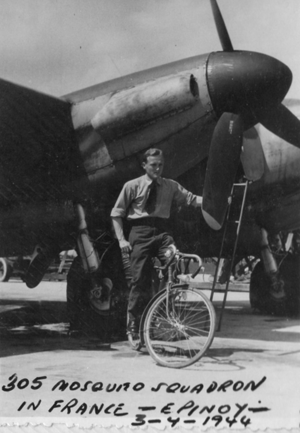
RAF 305 Squadron
|
|
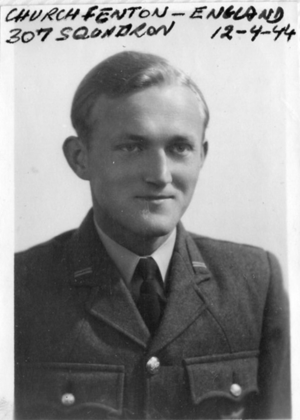
RAF 307 Squadron
|
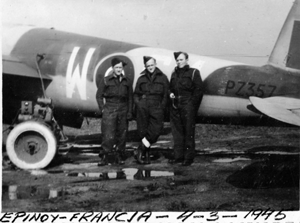
RAF 305 Squadron
I was then posted to the 307 Mosquito Squadron stationed in Churchfenton, Yorkshire. The transfer did not last long since I was then sent to the 305th Squadron stationed in Epinay, Northern France. All this time, Allied troops were moving forward, liberating Belgium and Holland and invading Germany. My squadron moved from place to place, as the battle lines moved forward. Our last location was at Wahn, near Cologne, Germany, where we stayed until 1947 when we returned to England to be demobilized. While being in Germany (as a part of the British occupation Forces) I took the opportunity on one of my leaves to go to France and visit Paris with all its exciting highlights and on to the French Riviera. With Monte Carlo being close by I stopped to take in all the excitement of the gambling casino and to rub elbows with the elite. With the Italian border being close by I was given permission to cross over the border and take a short walk on Italian soil.
I have to go back for a moment to 1941 and Latrun, Palestine. Word spread that soon we would be moved to Egypt and perhaps see some action against German troops. All indication pointed in that direction when some older personnel, after their physical examinations, were discharged and sent to England. After finding out that one of the fellows who was being discharged lived close to my hometown in Poland, I gave him a letter and included photos which I accumulated since I left Poland and asked him to deliver them to my family in case I did not return from the war.
Sure enough, our Brigade was sent to Tobruk where I had been involved in a few different battles. Thank God, I survived!!
Six years later, while being in London in one of the Polish restaurants, quite by accident, I ran into the fellow with whom I left my letter and photos before leaving for Tobruk. After a long chat discussing our happenings in the past years, he handed me the packet which he didn't have a chance to deliver to my family in Poland.
Poles who did not want to return to Communist dominated Poland were given free passage to any country in the world. Because an entry visa to the United States was so difficult to obtain, I decided to emigrate to Argentina, thinking that it would be easier to get to the U.S. from there. It was not so! I lived in Argentina for nine years.
On February 7, 1949, my friend, Joe, and I left Southampton on an Argentinian ship named "CORDOBA". To our surprise on the ship (among the many immigrants) were a bunch of fellows from our squadron! This made our journey more pleasant. One of our main pass-times was to learn Spanish as much as possible. Crossing the Equator again, traditionally, we went through all kinds of wetting sessions. Next short stop was Rio, this time as a civilian. Finally arriving at our destination, Buenos Aires, I was greeted by a friend with whom I stayed. Shortly after I found my uncle and the Rodak family and moved into their home. Here I stayed on and off as many years as I resided in Argentina. To this day we keep in touch. Joe, with whom I started the journey to Argentina, did not stay but went back to England. A year later the U.S. granted entry visas to many Poles staying in England. Joe was one of them. Ironically, nine years later he was the one who sponsored me to the U.S. Good friends are hard to find, believe me. They do exist!!!
My first job in Argentina was a very strange one. I was employed by a company which had a whale processing factory on the South Georgia Island, near Antarctica in the Bay of Grytviken. On the same island there were two more factories; one owned by the British and the other by a Norwegian Company
Our company had four small ships to hunt whales. These had powerful engines and were equipped with a cannon in front
As a rule, whales travel in groups. When found, ships were notified by radio and given their position. These whales were followed and from a short distance shot and killed. They were then inflated with air and marked with a tall company flag and left floating. At the end of each day they were picked up and hauled to the factory. There the crew dissected the whales. The pieces were thrown into large boilers under steam-pressure to separate the oil. The rest was ground and used in commercial fertilizers. In 1956 the International Commission stopped the whale slaughter. The factories on South Georgia were closed. While there I came up with the idea to do some carving and engraving on whale's teeth. In fact, I made several penguin replicas which were given as gifts to friends throughout the world.
I'd like to mention a few words about seals. The only time seals came ashore was when the female was ready to give birth. That's when seal hunts began. Search for the seals was only around South Georgia Island. When they were found, the ship anchored, and the crew went ashore in rowboats to kill and skin the bulls only. The skins were then tied and hauled aboard the ship and taken to a processing plant. I remember one day the hunt was so successful that the crew, in spite of warnings that the high tide was approaching continued working. The tide rolled in and was so high that we couldn't get back to the ship by rowboat. A rope was shot to shore and we were pulled aboard in the ice-cold water. Our greediness almost cost us our lives. My sciatic nerve was affected by the cold water. I was flat on my back for several weeks. I wonder if it was all worth it.
Penguins were fascinating creatures. One day we were assigned to pick up some of their eggs. After picking half a pail we discovered they were already in the process of hatching. Gently, we emptied the bucket. To our surprise the mothers of the eggs came and picked out their own to take back to their nests. How they recognized which eggs belonged to them was a mystery to us. From that day on I would never again agree to take eggs from any of their nests.
After two tours, each eight months long, I had had enough adventure, excitement and hard work - so I quit that job. Inflation in Argentina at that time became so high that in spite of our being very well paid, we did not gain anything financially.
I soon found another job at the military airfield in the instruments department. While working there, I found out that the department was practically run by Polish Air Force personnel, a few of whom I knew from England. That, of course, immediately created pleasant working conditions. (By the way, many of my co-workers presently reside in L.A.) There I upgraded my knowledge in the mechanical field.
One evening in a Polish Club I was introduced to a man who happened to be a head man in charge of field worker's electrical personnel. After a short conversation I discovered he was badly in need of a precision mechanic to assemble a hydro-electric station. The offer was too good to refuse. A few days later, I was on a train destined for Tucuman located in the northwestern mountains of Argentina. There I met real Argentine “Gauchos”. The job lasted until I received a cable from the U.S. Embassy stating that my visa to enter the U. S. finally arrived
I left Argentina in October, 1957, travelling through Chile and other South American Countries by air, arriving in Miami, Florida. After a short stay, I travelled across the southern U.S. by bus and arrived in Los Angeles, California. Friends from the 305th Squadron welcomed me and gave me lodging in their home. Thanks to the help they gave me and the help of many other people, I soon adapted to the new environment - a very different one from all the other places I had been. I have to mention a couple of exciting moments which happened to me on my way to Los Angeles. In New Orleans while changing buses, I was picked up by immigration officials. Since my passport with the official entry visa to the U.S. was taken from me in Miami (the port of entry to the U.S.) I had no documents to prove that I was here legally. I told them to be quick about checking me out since my bus was leaving shortly. They were very nice about it. I was curious why I was picked by them from a whole bus-load of passengers. They informed me that this is what they're trained for. It wasn't long when I was given the OK to travel on my way to Houston. Texas where we took a dinner break. After enjoying my meal, I decided to send a few cards to my friends. I then inquired about my bus and was told that it had left an hour ago - suitcase and all. I was told not to worry since someone would be waiting for me with my baggage at the next stop. Sure enough, in spite of the late hour, I had my belongings back. There and then I knew that I was in a great country!!
In January, 1958, I found a job at U.S. Pipe Corporation, which I worked until my retirement. On November 15, 1958, I married Helen Sawa, the daughter of Polish immigrants. We are the proud parents of two wonderful sons, Michael and James. We enjoy every day of our life together.
In May 1991, I received an invitation from the Alumni Association of the Military School of Minors in Poland to spend a two week vacation with my old colleagues at the Military Rest Center in ROGOWO near KOLOBRZEG, a Baltic Sea resort. Everywhere I went, I was well received and the hospitality was very gracious. After more than half a century I renewed friendships with my school companions of the past. My visit to Poland included a tour of the School for Minors in SREM, now home to an Air Force regiment. Major Maczakowski kindly gave me a tour through the school buildings. I was very moved by the old memories.
Written in Gdansk, Poland in May 1991
Translated to English in California May 1994
|
|
